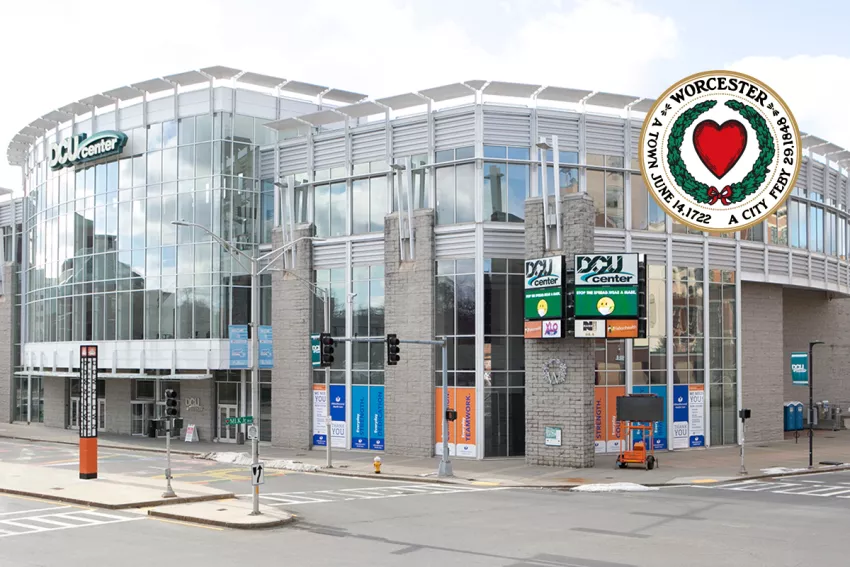Photo above: The UMass Memorial DCU Center Field Hospital, pictured here, was a collaboration between UMass Memorial Health and the City of Worcester.
It’s not easy to find a silver lining in a catastrophic global pandemic. Yet, Matilde (Mattie) Castiel, MD, sounds almost nostalgic when she describes how over 20 organizations in her Worcester, Massachusetts, community came together to fight COVID-19. She sounds energized when she explains how the same organizations could work together to tackle other public health problems — if they shared and consolidated their data. Now, a $1 million donation from UMass Memorial Health will be used to purchase that data, the first step in a larger effort.
The donation established the Worcester Health Equity Fund to help the City of Worcester improve health equity and reduce health disparities among residents. The amount is equivalent to five years of real estate taxes on a local property UMass Memorial purchased to add capacity amid the ongoing bed shortage. Because UMass Memorial is a nonprofit, the property will become tax exempt beginning in 2023.
“To understand where the city is today, you have to go back to the pandemic,” said Castiel, who serves as Commissioner of Health & Human Services in Worcester. She is one of three city-appointed members of the Health Equity Advisory Group, which is responsible for disbursing monies in the Worcester Health Equity Fund. Two additional group members are appointed by UMass Memorial.
“It was a time of extraordinary collaboration between health care and public health organizations in the city — and it started with the connection between the City of Worcester and UMass Memorial Health.”
Coming together against COVID-19
While UMass Memorial and the City of Worcester have worked together in multiple capacities over the years, the spread of COVID-19 brought the two organizations into a new era of collaboration. In 2020, they created a COVID-19 Equity Task Force to address the fact that local minority groups were feeling the impact of the pandemic disproportionately. Twenty other organizations joined the task force’s efforts to provide prevention and education information, launch public testing programs, and implement a low-barrier vaccination program for at-risk populations.
UMass Memorial’s data analytics team used geospatial mapping analysis to identify areas with the most COVID-19 cases. Jeanne Shirshac, Vice President of Health Policy and Public Programs at UMass Memorial, and her team generated weekly reports on the infection rates in Worcester and surrounding communities, broken down by age, sex/gender and race/ethnicity.
“The data made it clear that we needed to make sure those neighborhood resources were in place — not just during the pandemic but for the future,” Shirshac said. “This was an opportunity for us to improve health care access for everyone in our communities. And we learned a lot that we can apply to other public health issues.”
“Being able to act on the data UMass Memorial provided was amazing,” Castiel said. “Having all these organizations working together had an enormous impact on outcomes in our community
Using data to identify effects of opioid use
As the need for testing and vaccination sites waned, Castiel wanted to find a way to keep the organizations that had been involved in the city’s COVID-19 response from going their separate ways. The donation from UMass Memorial and the creation of the Worcester Health Equity Fund seemed the perfect opportunity to renew and expand efforts to work together.
The Health Equity Advisory Group decided to apply the funds specifically to a project that will bring together data from the different electronic medical record systems used by UMass Memorial, St. Vincent Hospital and community health centers into a common format. With that data, they will have a fuller picture of how specific health issues — opioid use disorder or diabetes, for example — are affecting people in the community. Then they can use that information to identify opportunities for improvement and change.
“We can look at race and ethnicity. We can do some geomapping. We can examine the touchpoints for people with different health conditions. What happens during the time a patient who uses opioids is engaged with the health care system? How do we make the health care system more welcoming for them? Are A1C levels higher among people with diabetes who are certain ages or ethnicities?” Castiel said. “With access to real-time data over the course of a year and Jeanne Shirshac’s amazing dashboards pulling it all together, we’ll begin to have the information we need to answer questions like these and determine how we can make the most impact in the community.”
While COVID-19 presented extraordinary circumstances, Eric Dickson, MD, President and CEO of UMass Memorial Health, prioritizes continuing the partnership with the City of Worcester and other community partners to address health inequities and improve health for all.
“To be an agent for positive change in this region, we have to expand our work beyond the walls of our great hospitals and clinical offices,” he said. “We’re committed to improving the health and well-being of the community while working hard to minimize the social determinants of health that persist as barriers to underserved populations. Part of that commitment is pivoting as necessary and providing support for the urgent health needs of our community.”
View more stories of healing, advancing medicine and innovating from UMass Memorial Health.


